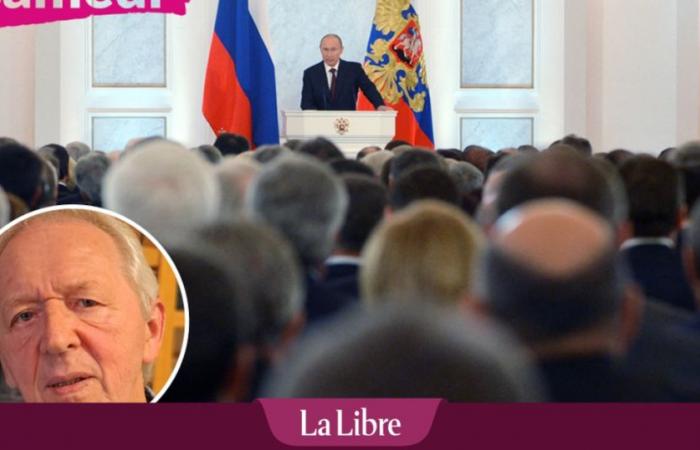How did you become head of Editions du Progrès?
Upon the death of Leonid Brezhnev, the Central Committee of the Communist Party placed me as literary director of this highly respected publishing house, of which I subsequently took over. It was Mikhail Gorbachev who signed the document approving my appointment. The time was open to the West, and many people were interested in Russia. I have been invited to testify in many countries. At Editions du Progrès, we published classics of Marxism in foreign languages and we translated a large number of works by foreign authors into Russian. And this, in 52 languages. We also had the mission of translating, sometimes in a single copy, “secret” works, because they were anti-Soviet, that the highest authorities in the country wanted to analyze. At the time, some perceived me as a dissident, but everyone thought I was protected. There were myths around me, especially about my origins.
Why did you give up everything and settle in Belgium?
In the 1980s, I used to go to the Frankfurt Book Fair, where I met the love of my life, Dominique, a Belgian. We moved to Moscow but, a few years later, I began to have serious problems linked to the new political period, with privatizations, the strengthening of the mafia, which merged with power. Personal threats, blocking of bank accounts, stalking, defamation…: bandits who had enriched themselves made my life hell. So I left the head of Progress, but I stayed a few more years in Moscow, doing different jobs. In 1999, my wife convinced me to go abroad for two or three years. Except that, in the meantime, Vladimir Putin has come to head the country. And there, I realized that all the doors were closing for me forever. So I’ve been living in Belgium for over 25 years.
Since the war in Ukraineis it now difficult to be a Russian abroad?
You have to live with it. I have never changed my soul, I remain very attached to Russia, I follow everything that happens there. What saddens me more than anything is that my children stayed there. I only see my grandchildren growing up through social media. Given what I say and write about the diet, my wife now forbids me from going back to it.
What would you risk if you set foot on Russian soil today?
I don't know exactly, but I received warnings from these people who control the internet, the press… I'm supposed to clean up my social networks.
Do your relatives back in Russia support the war in Ukraine?
As I age, my circle of friends shrinks. All my relatives at the time, who were rather anti-Soviet like me, share my opinions. On the other hand, I have stopped communicating with a whole series of acquaintances, because I do not understand what is in their heads now. What I understand, however, is that Putin's regime mutilates the social fabric, but also the brains. Imagine that this week the Patriarch, who is God's interlocutor, said that the Orthodox Church supports the reintroduction of the death penalty… Russia is mentally very ill.
In recent weeks, the release of the posthumous memoirs ofAlexei Navalny made a lot of noise. What does this book teach us?
I have been following Navalny's activities for a long time. I even signed up on Twitter to stay up to date with his actions and work. In terms of events, I didn't discover much when reading his memoirs. But what touched me the most were his thoughts and his evolution. He was someone who had family in Ukraine and Russia, who grew up in an environment where politics was not discussed. However, he always had his eyes wide open to the world. Very early on he began to know the difference between reality and the mythological image created in official discourse. Noting this discrepancy, a critical mind was formed. He had reached incredible levels of thought. The small episodes that make up Navalny's book allowed me to understand and admire him even more.
Can these memories harm Vladimir Putin?
Obviously, Navalny is ruthless when he talks about corruption in the country. Vladimir Putin has ruled Russia for almost a quarter of a century through a combination of societal controls. Navalny denounces the way in which Putin has appropriated all the riches of the Russian subsoil, the church, art… But the Russian president is not a great reader. Those around him are apparently looking for sentences in these memoirs that can offend, lèse-majesté. That said, there is nothing more they can do to Navalny since this regime has already killed him.
Do you have the impression that Navalny's death has cooled Putin's opponents?
Navalny's assassination is a cold shower for a lot of people who are now much more cautious. But some, even imprisoned, choose to continue to oppose the regime. However, not many of them have this courage. You never know what might happen when you piss off Vladimir Putin. Navalny also tells an anecdote in his book concerning Boris Nemtsov. Three days before his assassination, the latter had advised Navalny to be careful because he was exposing himself in an incredible way. Navalny returned the remark, saying that he was not more discreet in his criticism of the Kremlin. Nemtsov then responded that as a national of the system and a former minister, he had nothing to worry about because he belonged to the clan. He felt that no one would ever dare to kill him. Three days later, Nemtsov was assassinated near the Kremlin, on Vladimir Putin's birthday.
Navalny's conditions of detention were horrific. It was torture. The way he explains how he came to understand that he would never leave the walls of his prison is poignant. During his last meeting with his wife, he told her that he was convinced that he would not leave his cell alive. Even at the first sign of the regime's collapse, he knew they were going to get rid of him. His wife, Yulia Navalnaïa, admitted to thinking so too. What an exchange!






